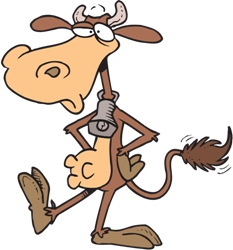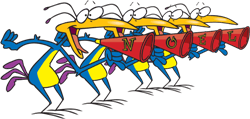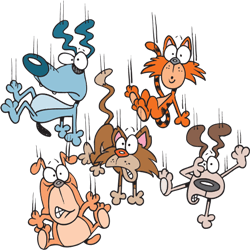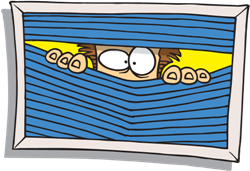Indefinite Pronouns
Indefinite means "without a fixed limit" or "unlimited."
Click Here for Step-by-Step Rules, Stories and Exercises to Practice All English Tenses
Indefinite pronouns are pronouns that do not refer to any specific person or thing.
First, let us quickly review pronouns.
Pronouns are words that replace a noun.
For example:

Consider this sentence:
Bill and Jane work in the same office.
I can replace the noun phrase Bill and Jane with the pronoun They.
They work in the same office.
"They" is a pronoun.
Here are a few more examples of pronouns:
- who
- myself
- she
- it
- mine
- hers
Indefinite Pronouns
Indefinite pronouns are pronouns that can be used to replace an unlimited number of nouns.They do not replace any specific noun.
Singular or Plural
Most indefinite pronouns are either singular or plural, but some are both.Let's look at some commonly used indefinite pronouns.
Singular indefinite pronouns:
-
another

- anybody
- anyone
- anything
- each
- either
- everybody
- everyone
- everything
- neither
- nobody
- no one
- nothing
- one
- other
- somebody
- someone
-
something
Plural indefinite pronouns:
- both
- few
- many
- others
-
several

Indefinite pronouns that can be singular and plural (we will explain how this is possible):
- all
- any
- more
- most
- none
- some
- such


A) Singular indefinite pronouns take on a singular verb or singular personal pronoun
-
Incorrect:
Each employee have a desk. -
Correct:
Each employee has a desk. -
Incorrect:
Everyone like the beach. -
Correct:
Everyone likes the beach. -
Incorrect:
One of the men forgot their lunch. -
Correct:
One of the men forgot his lunch.
Here are a few more examples:
-
Everybody enjoys chocolate ice cream.
-
I ran faster than the other girl during the race.
-
Someone left a coat in the locker room.
-
I need to eat something today.
-
Everything is wet from the rainstorm.
-
Yes, I will eat one.
-
Nobody likes attending funerals.
- I don't want anything on my hamburger.

B) Plural indefinite pronouns take on a plural verb or a plural personal pronoun
-
Incorrect:
Both was at the wedding. -
Correct:
Both were at the wedding. -
Incorrect:
Few people cast his vote. -
Correct:
Few people cast their vote.
Here are a few more examples:
-
Many people enjoy taking their dogs to the park.
-
Some like cars more than others.
-
Several teachers have applied for the job.
- Most people like either chicken or steak. I like both.

C) For indefinite pronouns that can be both singular and plural, it depends on what the pronoun refers to
Examples:
-
All of the employees received their bonus checks.
All refers to employees, which is plural.
-
All of the drink is gone.
All refers to the drink, which is singular.
-
I replaced the bulbs, but none are working.
None refers to bulbs, which is plural.
-
None of the light is getting through the blinds.
None refers to the light, which is singular.
These were the uses of Indefinite Pronouns. Now that you know them, it is time to practice! Read and do exercises.
Get Updates, Special Offers, and English Resources
Download your FREE GIFT (the first two chapters of
English Short Stories Book and Workbook)
as soon as you join!

By submitting your email, you consent to receiving updates and newsletters from us and to the sharing of your personal data with third parties for the purposes of sending you communications. We will not spam you. You can unsubscribe at any time. For more information, please see our privacy policy.





